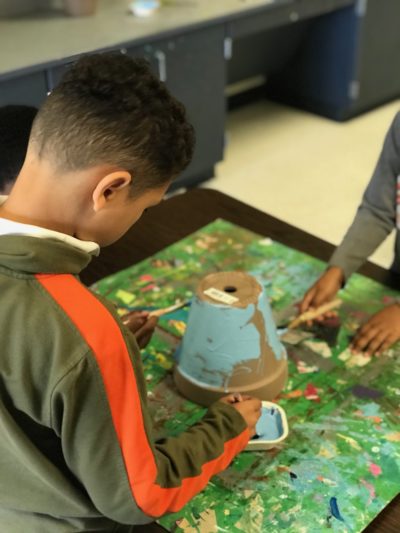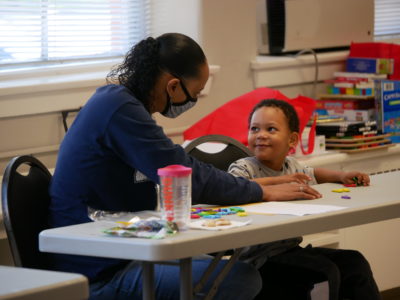

Share this story
- Of the more than 34,000 children who've experienced the death of a parent since 2020, less than 8% were due to COVID-19. Supporting all bereaved children is crucial to their futures.
- No one knows for sure how many children in NC have experienced the death of a parent. “Even now, the CDC measures the death event. They don’t measure who survived it.”
|
|
A new report reveals only a small fraction of children who experienced the death of a parent during the pandemic did so due to COVID-19.
The report from Evermore, a national nonprofit organization advocating for support of bereaved children and families, estimates that 34,581 children in North Carolina experienced the death of a parent between 2020 and 2022.
Just 2,575 of those children lost a parent to COVID-19 — less than 8%.
The death of a parent can have significant negative impacts on children over the course of their lives. As the authors of the report explain, “Compared to nonbereaved children, bereaved children are at higher risk of academic failure, depression, alcohol and substance misuse, violent crime, suicide attempts, suicide, and premature death from any cause.”
As policymakers begin to consider strategies that could prevent these outcomes, Joyal Mulheron, founder and executive director of Evermore, is worried they may focus solely on children whose parents were killed by COVID-19.
“By leaving homicide victims out of this, and leaving suicide and overdose out,” Mulheron told EdNC, “we will be leaving so many incredibly vulnerable children behind.”
Measuring bereavement
Despite Evermore’s new estimates, no one actually knows how many children are parentally bereaved, whether due to COVID-19 or for any other reason.
“Even now, the CDC measures the death event,” Mulheron said. “They don’t measure who survived it.”
To estimate the number of children impacted by the death of a parent, Evermore’s researchers used a relatively conservative mathematical methodology, based on available mortality and population data. They also defined parents simply as biological, adoptive, or step-parents who lived with the child. This resulted in an estimate of 2,575 parentally bereaved children due to COVID-19 in North Carolina.
Other researchers have taken a different approach.
A team led by Susan Hillis, a CDC COVID response researcher, published a report in October 2021 about the number of children who had experienced a caregiver’s death due to COVID-19.
In their report, a caregiver was anyone who lived in the home and provided some or all of a child’s care. In some households this would be limited to parental figures. In others it may include aunts, uncles, or grandparents. The researchers focused their attention specifically on COVID-19-associated deaths, but included both primary and secondary caregivers.
This much broader category, as well as a different overall mathematical methodology, resulted in an estimate that would put the number of children impacted by the death of a caregiver due to COVID-19 at approximately 7,250 by the end of 2022.
The gap between these two specific estimates points to a general challenge highlighted by the pandemic — there is no system in place to count the number of children who have experienced the death of a parent or caregiver.
Bereavement beyond the pandemic
As EdNC has previously reported, schools around the state have a variety of strategies in place to support grieving children. But much like there’s no system in place to count the number of children who have experienced the death of a caregiver, there is also no statewide or national bereavement policy.
Mulheron wants to change that.
Her career in public health — including advising governors and the Obama White House — was disrupted in 2010 by the death of her daughter. And the grief didn’t stop there.
“Every morning I would wake up and there was a new national tragedy,” Mulheron said. “I left my job because I felt something else needed to exist for bereaved people, but I wasn’t sure what it was.”
Trained as a scientist, she started collecting data, talking to individuals — first in Washington, D.C., then across the country — to learn about their experience with bereavement.
“I began to realize that it wasn’t just a personal tragedy… this was a public health problem at a massive level,” Mulheron said.
Prior to the pandemic, Mulheron described meeting with both Republican and Democratic members of Congress.
“I said, ‘I think we have a massive public health problem hiding in plain sight. And it’s gonna sound bananas, but [it’s] bereavement,’” Mulheron said.
That public health problem has only been exacerbated by the pandemic. COVID-19 has killed more than one million Americans, but the pandemic also saw an increase in deaths due to opioids, car crashes, and gun violence.
In their report, Evermore’s researchers estimated all parental deaths — both before and after 2020, and from causes other than COVID-19. Using their calculations, EdNC estimates there are now more than 72,000 children in North Carolina who are parentally bereaved.
And supporting them is critical. According to the Evermore report:
When a child is bereaved, there is an exact inflection point at which their short- and longterm physiological, psychological, and sociological fitness are placed at risk. Immediately after a parent dies, the people who support individuals, families, and communities have a distinct and rare opportunity to intervene, thus altering the trajectory of a child’s life toward stability—before his or her mental, social, and economic well-being becomes fragile and destabilized.
And for Mulheron, the cause of death shouldn’t be a factor in determining whether children get the support they deserve.
“It is not how the parents died,” Mulheron said. “It’s that they died.”





